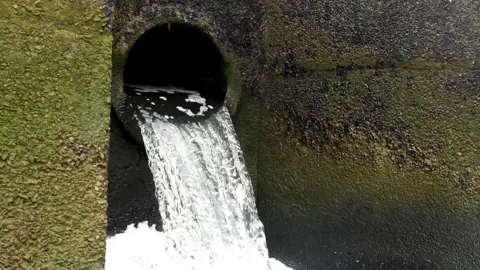BBC Climate & Science
 Getty
GettyThe water sector in England and Wales is failing and needs stronger regulation to better protect billpayers and the environment, according to the interim findings of a landmark review.
The independent Water Commission, led by former Bank of England deputy governor Sir Jon Cunliffe, said on Tuesday that public trust had been shaken by “pollution, financial difficulties, mismanagement [and] infrastructure failures”.
It added that there needed to be clearer direction from government, a better approach to long-term investment, and a stronger voice for local communities.
The review was set up by the government in October amid growing public concern about sewage spills and rising bills.
In launching the review, the government had ruled out nationalising the sector – arguing this would be too expensive and would not necessarily lead to improvements.
“There is no simple, single change, no matter how radical, that will deliver the fundamental reset that is needed for the water sector,” Sir Jon said.
“We have heard of deep-rooted, systemic and interlocking failures over the years – failure in government’s strategy and planning for the future, failure in regulation to protect both the billpayer and the environment and failure by some water companies and their owners to act in the public, as well as their private, interest.”
He added that new legislation would be needed.
In response to Sir Jon’s findings, Environment Secretary Steve Reed described the water system as “broken”, adding that the government would respond to the commission in full.
Stronger role for regulators
Perhaps Sir Jon’s strongest words were on the role of the regulators – the Environment Agency, Natural Resources Wales and Ofwat – to make sure private water companies act “in the public interest”.
Speaking to BBC Breakfast, he said: “We’re certainly talking about the environment regulators – the Environment Agency [in England], Natural Resources in Wales – not just having more people and more resources, but also having modern technology so that they can monitor and so that they can follow up and hold companies to account.”
“On the economic regulation side [Ofwat], we really need a regulator that is close to companies, that oversees them and monitors them continuously, as we do in financial services with the banks – not just so they can intervene early… but so they can support companies to improve,” he added.
“Some of that has started but an awful lot more needs to be done.”
The Water Commission added that it was considering options for “significant streamlining and alignment of the regulators” to address these challenges.
In response, the Environment Agency said it appreciated the conversations it had had with the commission and would continue to work with Sir Jon and his team before the final report is submitted to the government.
Ofwat has also been contacted for comment.
At just over 100 pages long, the commission’s interim findings are a precursor to the main report, which is expected be published later this summer and give recommendations.
It considered more than 50,000 responses submitted across the water sector, from the public, environmental groups, regulators and water companies themselves.
“What we heard was clear: the current system is not delivering what people expect and need,” Sir Jon said in a forward to the report.
The government asked Sir Jon to focus on reforms to the water sector as a whole, rather than individual water companies.
Pressure on the water sector is increasing due to climate change, population growth and other factors – but it is also suffering from decades of underinvestment.
Increased monitoring has led to greater scrutiny into the amount of sewage being spilled into our rivers, lakes and seas. In total the spills from overflow pipes lasted more than 3.6 million hours in both 2023 and 2024.
Releasing raw sewage into rivers and the sea can be legal if spills happen during wet weather, though it can still pose risks to people and the environment.
But the BBC has previously uncovered evidence of likely spills during dry days as well.
In April, bills rose by an average of 26% in England and Wales, as regulators approved water companies’ plans for billions of pounds of investment. This is aimed at both upgrading water supplies and reducing the amount of sewage being spilled.

